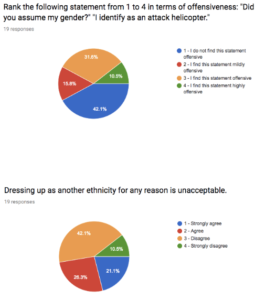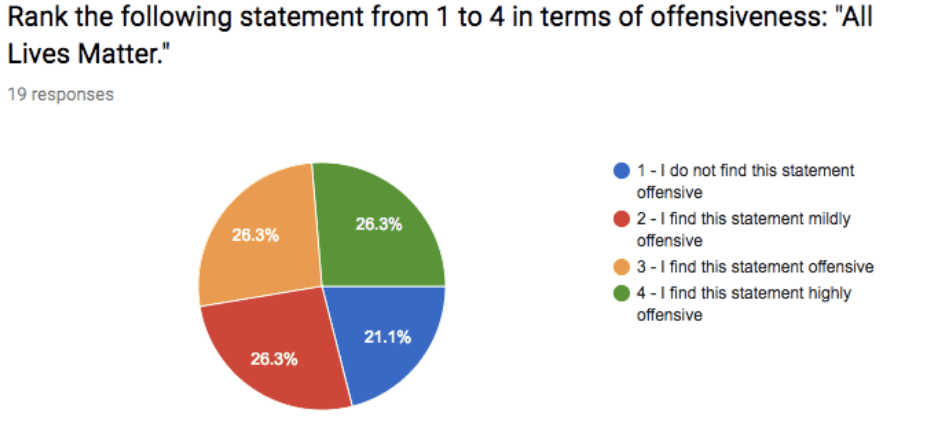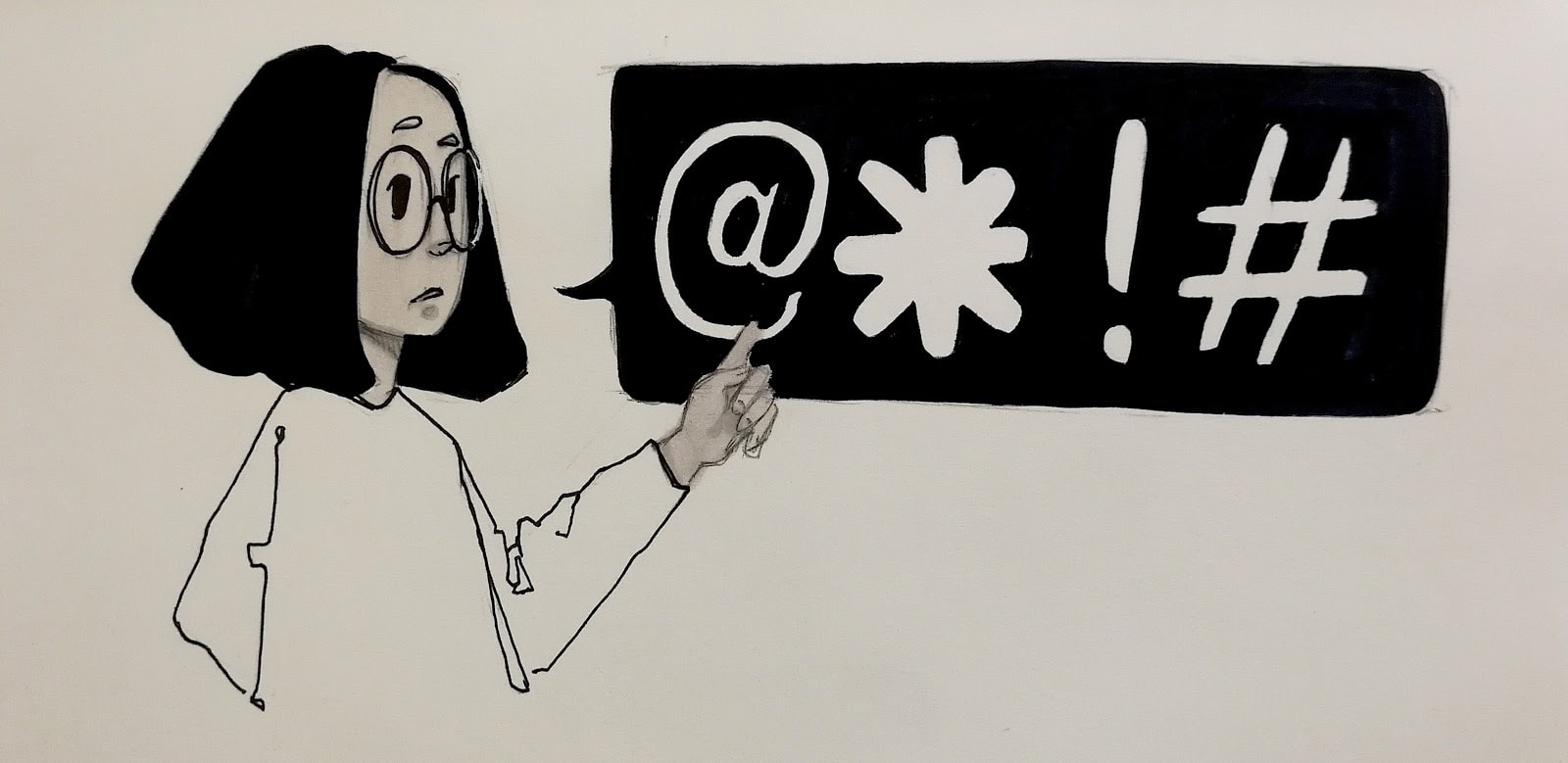It occurred to me as I sat at my desk writing this article, tapping the words out with fingers stiff from the sudden Reims cold, that the premise of this article would also work as the opening of a terrible joke. It would begin with something like “two Sciences Po students walk into a politically correct bar…” The punchline, however, would depend on your definition of political correctness.
The Sundial Press released a Facebook survey on October 29, 2018 in an attempt to figure out that punchline. “What does political correctness mean to you?” the Sundial Press asked, and unfortunately only 19 students responded. Participants were presented with an array of controversial statements – from “did you assume my gender?” jokes to the use of the word “retard” – and then asked to rank their offensiveness.
 In the responses, there was no discernable link between nationality and sensitivity as answers varied vey much and most of the 19 respondents were North American and/or European. This also makes it difficult to generalize findings to encompass the entire university. Overall, 42.1% of respondents considered gender jokes innocuous and 57.2% thought that dressing up as another ethnicity was acceptable. Other phrases, such as “All Lives Matter”, garnered a much more conflicting response, with reactions evenly split between “not offensive” (21.1%), “mildly offensive” (26.3%), “offensive” (26.3%) and “highly offensive” (26.3%).
In the responses, there was no discernable link between nationality and sensitivity as answers varied vey much and most of the 19 respondents were North American and/or European. This also makes it difficult to generalize findings to encompass the entire university. Overall, 42.1% of respondents considered gender jokes innocuous and 57.2% thought that dressing up as another ethnicity was acceptable. Other phrases, such as “All Lives Matter”, garnered a much more conflicting response, with reactions evenly split between “not offensive” (21.1%), “mildly offensive” (26.3%), “offensive” (26.3%) and “highly offensive” (26.3%).
Many added that it was difficult to judge offensiveness without a context, which could make each statement more or less offensive. Others dismissed the concept of political correctness asa whole, citing the idea that “words are just words”. Others argued that political correctness is simply a matter of human decency.
As I clicked through the survey results, I found myself passing judgment, despite my best efforts to remain neutral. A raised eyebrow here and a nod there, my own convictions coloured my judgement.

If you ask me about my beliefs, I would be able to give you a size twelve, Times New Roman, double-spaced list. Once the obvious “every human being should have equal rights and opportunities” was out of the way, I would tell you that I am a leftist. I would declare that it is impossible to separate the personal from the political and that the borderline racist punchline you might laugh at will invariably carry repercussions into public life. And, for this reason, I would argue that actions should be evaluated against the backdrop of political correctness – two words that have become increasingly difficult to say over the years without eliciting a strong reaction.
As it is used today, the term “political correctness” has adopted a borderline radical connotation associated with the far-left. Odd, as I had always found it to be an over-complicated way of saying “common courtesy”, the idea that offensive actions and language should be avoided to account for ethnic, cultural, ideological, and personal differences.
For instance, I consider “did you assume my gender?” jokes to be transphobic in that it trivializes the struggle for widespread acceptance of non-cis genders. Black Lives Matter should not be countered with “All Lives Matter” and there is a fine line between cultural appropriation and cultural appreciation so it is better not to walk it.
Of course, these are personal values. As the survey has shown, disagreement is inevitable, especially in an institution that prides itself on its diversity, as Sciences Po does. According to Sciences Po’s 2017 admissions report, 3 out of every 4 enrolled students are international. This results in a campus where hundreds of students interact on a daily basis with those who, due to their culture, have a different conception of offensiveness and compassion.
The catch is that I am convinced that my values are correct. But then again, so does every other person with opinions – such is the strength and the flaw of conviction. We may be able to step an inch or two out of the door, but as human beings we will always be unable to completely escape our own heads and our bone-deep belief that we are right.
In such a context, political correctness is more important than ever, regardless of whether you believe it to be a rejection of freedom of speech or a bible of morality. Although it is convenient to think so, the reality is that words are never “just words”. If they were, then sexual minorities would not be at a much higher risk of suicide and hate speech would not be so effective at provoking violence. However, political correctness is also not an excuse to sling the word “sexist” at anyone who does not call themselves a feminist.
Rather than being a manifesto to swear by, political correctness is a necessary tool in the international exchange of ideas. It is a means of acknowledging and accommodating differences. It is an essential reminder of minorities, the voices that are usually lost in the drone of the majority but that are no less important.
You should not be bound by political correctness, but you should listen to what it has to say. Political correctness draws the lines but ultimately you are the one who decides where you stand.
Feel free to correct me if I am wrong.
Survey results: https://drive.google.com/file/d/19Kuhk5zz4ICrwKBxVku_Ypa5_jQz6T8t/view?usp=sharing
Michelle Wei is an Opinion writer for The Sundial Press. Born and raised in Toronto, Canada, she is now a first year student at Sciences Po in the Dual BA with the University of British Columbia.
Are you angry? Do you disagree? Write a response column by first contacting the editor, and we’ll publish your dissenting opinion.
Other posts that may interest you:
- Be Radical, Not Neutral
- The Canada We Don’t Talk About
- Sexual Violence in the Spotlight
- 100 Years at Vimy Ridge
- Why I Don’t Bother Coming Out
Discover more from The Sundial Press
Subscribe to get the latest posts sent to your email.





